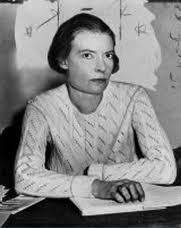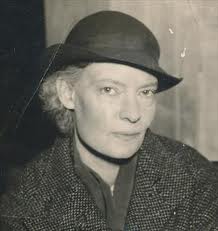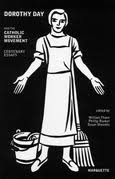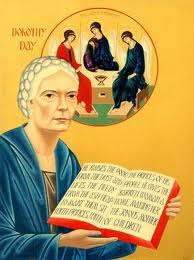All the Way to Heaven: The Selected Letters of Dorothy Day; Marquette University Press (2011), $35
Reviewed by Jack Downey
The acclaimed Catholic University of America professor, John Tracy Ellis, once said that you can’t be a good historian unless you enjoy reading dead people’s mail. Happily for anyone who considers herself a Dorothy Day aficionado but has neither the resources nor the particular inclination to hoof it out to Milwaukee to visit the glorious Dorothy Day-Catholic Worker Archives at Marquette University, the universe has given us the Orbis Books editor-in-chief and Day historian extraordinaire, Robert Ellsberg. His new anthology of Dorothy’s letters, All the Way to Heaven, joins its brick-sized companion volume of her journals – The Duty of Delight – to give anyone with a public library card or an few extra bucks in his pocket a glimpse into the intimate thoughts and correspondence of this icon of progressive American Catholic activism. That said, if you’re looking for an excuse to visit the birthplace of affordable hipster-friendly light beer, then a trip to the archives might be just what the doctor ordered.
David O’Brien, the eminent American Catholic historian and professor emeritus at Holy Cross, has called Dorothy Day “the most significant, interesting, and influential person in the history of American Catholicism.”[1] She was a journalist, convert, former Wobbly, absolute pacifist, mother of the radical Catholic Worker movement, and unofficial spiritual director to several generations of faith-based activists (Ellsberg included). She was a lover of Russian literature and has been called a “Catholic anarchist,” although she preferred the term “communitarian.” In 2000, a formal investigation into her cause for canonization was initiated, elevating her to the status of “Servant of God,” although not without controversy – marking what may be the first ever instance of disciples claiming that the institution is actually unworthy of its prospective member.
Day was a prolific writer, and her memoir, The Long Loneliness, has become an American classic. Much has been written by and about Day, but All the Way to Heaven gives readers an eye into Day’s (only slightly) less polished side. She took correspondence seriously, and wrote more frequently and with more deliberation than most of us can imagine. This coming from a woman who spent the vast majority of her adult life with the hungry and homeless, was investigated by the FBI, declined an honorary degree from Santa Clara University (and a gaggle of others) on moral grounds, protested the American entry into World War II, refused to vote, or pay federal taxes, or register the Worker for non-profit tax exemption. And while Day’s edge hasn’t yet been fully domesticated by mainstream, pastel Catholicism, Ellsberg’s work is an invaluable aid to those concerned with preserving her humanity, warts and all, as a matter of public record.
Did Dorothy ever get frustrated with her life at the Catholic Worker, or feel lonely, or dream of leaving it all, or fret about the question of her final perseverance in the faith? The answer to these rhetorical questions can be found in the pages of All the Way to Heaven. However, one of the greatest features of the book is the name index in the back. Ever wondered if Dorothy got frustrated with the younger, upcoming Jesuit priest-writer-activist celebrity Dan Berrigan (whom she loved dearly)? What did she have to say to Thomas Merton when he tactfully distanced himself from the Catholic Worker following the self-immolation of CW affiliate Roger LaPorte outside the U.N., in protest of American involvement in the Vietnam War? Just look it up.
One categorical addition that this anthology makes to the extant corpus of Day literature comes in the body of the book’s first chapter – Dorothy’s pre-conversion life: the juicy bit. Day’s early letters chronicle the tail end of her partnership with Forster Batterham, father of her only child, and “common-law husband” (as everyone loves to point out). Traditionally, Day partisans have roasted Batterham (a proud atheist) for his rejection of her gravitation towards Roman Catholicism, as well as his utter contempt for the institution of marriage. He’s the Jordan Catalano of Catholic Worker history, except less handsome, sensitive, or sympathetic. Persona non grata. But here’s the thing: while her letters to Forster give us previously hidden insights into “Dorothy in love,” and are very touching at times, she does, on occasion, come across as – may I be smote for even thinking this – just a wee tad, well… annoying.
Like the rest of us, Dorothy was not immune from jealousy, passive-aggression, even spite. We are, however, not used to seeing her like this: the Dorothy Day we know is controlled, dignified, self-sacrificing, and compassionate. Virtually her entire life as a public intellectual was characterized by composure, and the pain-filled emotional rollercoaster that is catalogued in these letters taps into some of the less honorable of our voyeuristic tendencies.[2] They may cause you to blush, squirm, possibly roll your eyes and exhale dramatically. Compounding this is the fact that they are arranged as essentially a run-on monologue, that marks the ebb and flow of her conflicted but passionate feelings for Batterham (whom we’re naturally predisposed to resent), spread over seven years, but condensed into some forty consecutive pages of text. All the Way to Heaven is a collection of Dorothy’s letters to other people. Forster, along with everyone else she addresses, is rendered functionally mute, which actually fabricates the unnatural illusion of self-absorption that runs contrary to our expectations of her.
Conversely, it is striking how rapidly her tone shifts with the founding of the The Catholic Worker newspaper (which Ellsberg would edit for two years) in 1933 and her assumption of communal responsibility. Less than a year after her last pleading letter to Forster, Day has metamorphosed into St. Dorothy: the activist spiritual leader role that is more familiar to us, governed by her characteristic propriety, compassion, and unrelenting discipline. Although it comes as a relief, it is also kind of sad. One piece of advice: if you’re not the least bit familiar with Day, start off by cutting your teeth on the Long Loneliness, From Union Square to Rome, or maybe Robert Coles’s short-but-sweet biography Dorothy Day: A Radical Devotion. Day’s letters put flesh on the bones of her conventional narrative, and while Ellsberg does flesh things out nicely with periodic editorial supplements, without some additional background, what would otherwise be rare and intriguing insights into the life of a human gem will be just… her mail.
[1] David J. O’Brien, “The Pilgrimage of Dorothy Day” in Commonweal 107 (December 19, 1980), 711.
[2] “Please do not be angry at me. You know I love you and as a matter of fact always did love you more than you loved me.”
“You certainly ought not to mind staying away from me, you have such a rotten opinion of me anyway. Our last two weekends have been anything but pleasant, as you said yourself, so please, please, stay away from me.”
“Thank you so much for the contribution, darling, but why don’t you send a word with it? Do you insist on hating me so much?
“I suppose the best thing for both of us would be if you contracted an alliance with some nice fat Jewish girl (your kind of beauty) even though I would be racked with jealousy if you did.”
“I am really not obsessed as you think I am.”
“As for me, I’m as blue as indigo… I have felt nothing but a blank loneliness since I left you. Life is indeed a more miserable affaire. Why don’t you become reasonable or indulgent or whatever you want to call it and tell me to come back and marry you?”
Jack Downey is an activist and doctoral candidate in Theology at Fordham University. His dissertation investigates modern asceticism and the Catholic Worker movement. Previous writing has appeared in Tricycle Magazine: The Buddhist Review.






